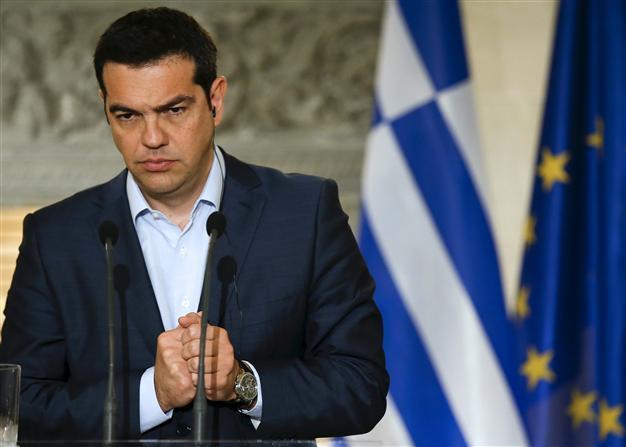Tsipras flies to Brussels to try to bridge gaps with Greece's creditors
ATHENS/BRUSSELS - Reuters

Greek Prime Minister Alexis Tsipras gestures during a news conference with Austrian Chancellor Werner Faymann at Maximos Mansion in Athens June 17, 2015. Reuters Photo
Greece's international lenders demanded on June 24 that it improve proposed tax and reform measures in a last-minute race to clinch a deal to unlock aid and avert a debt default next week.Sources close to the negotiations said the creditors had presented counter-proposals to Athens to overcome differences, with euro zone finance ministers due to convene at 1700 GMT to try to approve an agreement.
Before flying to Brussels for meetings with the creditors, leftist Greek Prime Minister Alexis Tsipras attacked the stance of "certain" creditors as strange because he said they had rejected measures Athens put forward to plug a budget gap.
"The repeated rejection of equivalent measures by certain institutions never occurred before - neither in Ireland nor Portugal," Tsipras tweeted.
"This odd stance seems to indicate that either there is no interest in an agreement or that special interests are being backed."
Financial markets reacted nervously to the downbeat comments from Athens, with investors rushing into safe-haven German bonds and the euro suffering a brief sell-off before regaining ground.
A European Union official insisted the talks had not broken down and the exchange of different proposals was a normal part of the negotiation. Greek Economy Minister George Stathakis said only three of Athens' 50 proposals were still in dispute.
But because there is so little time left to reach a deal before Greece has to make a repayment to the IMF on June 30, the day its current bailout expires, the talks were particularly fraught.
"Of course we want changes and they don't, and this is part of the bargaining process, albeit less effective when done publicly," a senior official of one of the creditors said.
Tsipras to meet lenders
Tsipras, who arrived in Brussels at 1100 GMT, was due to meet Commission President Jean-Claude Juncker and the heads of the International Monetary Fund, the European Central Bank, the Eurogroup of finance ministers and the euro zone's rescue fund in the early afternoon to try to thrash out remaining issues.
Before that, Juncker was meeting with the other leaders of the creditor institutions to prepare a common position.
Other issues still in dispute included the restoration of collective bargaining rights, opening up closed professions, investment and public sector wages, according to a source close to the talks.
Officials said the IMF was most concerned about the balance of the package, which was too heavily skewed towards tax increases that could further weaken the Greek economy and prove hard to collect, rather than structural reforms.
Also still in dispute were Greek demands for debt relief, which euro zone governments do not want to address at this stage, and IMF-led pressure for more steps to reform Greece's costly pension system.
The Greek proposals, which leaders of the 19 nations sharing the euro welcomed on June 22 as a basis for further negotiation, included a series of tax hikes and higher contributions to pensions to raise revenue and hit budget targets.
Greece will have to put the agreed measures through its parliament by June 22 so that some other euro zone parliaments can endorse the deal and unblock aid funds.
Athens must repay 1.6 billion euros to the IMF on June 30 . EU officials said the only way to provide money for that payment was for euro zone governments to hand over nearly 2 billion euros in profits from ECB holdings of Greek government bonds purchased in 2011-12.
Consequences of default
If Greece misses that payment and is declared in default to the IMF, it could trigger a bank run, capital controls and an eventual Greek exit from the euro zone, undermining the foundations of the currency.
Tsipras will face resistance in his leftist Syriza party, especially if he has to make further concessions at the last minute, but Stathakis said he was convinced the party would back a deal in parliament.
A series of street protests in Athens in recent days, some organised with Syriza's support, have underlined public opposition to yet more belt-tightening.
"There are four people in my household, and we are living on 600 euros a month. Where else does that happen?" said 59-year-old Antonia Methoniou, a cancer patient who took early retirement for health reasons.
The IMF says Greece will need either some form of debt restructuring or further loans to make its finances sustainable.
But euro zone officials insisted that the creditors would not discuss any debt restructuring until after Greece implements the remainder of its bailout programme, and German Chancellor Angela Merkel has ruled out any "haircut" or debt write-off.
This will add to the difficulty of getting parliamentary approval in Athens, notably from the nationalist Independent Greeks, whose support Tsipras needs for a majority.
They also reject moves to scrap VAT exemptions enjoyed by some Greek islands.
"I could not vote for such a measure, nor, obviously, could I participate in a government violating a line on which we received a mandate from the Greek people," party leader Panos Kammenos tweeted on June 23.
But Economy Minister Stathakis said he was confident parliament would back a deal before June 30: "I think this balanced deal is defensible to Syriza, and in Greek society too."
















